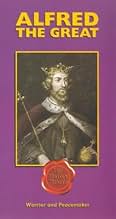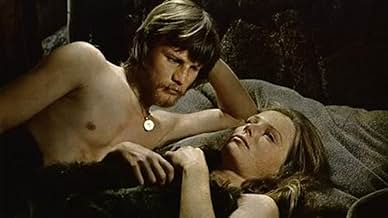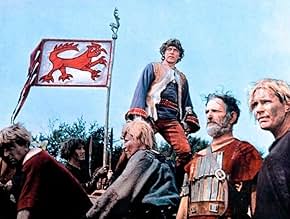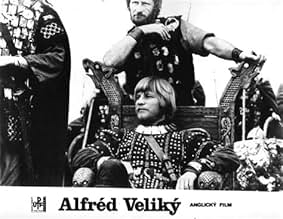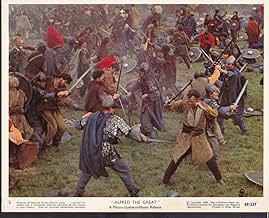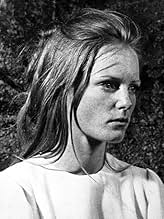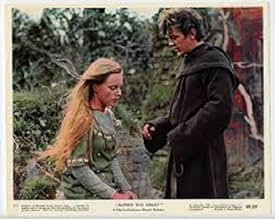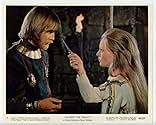Agrega una trama en tu idiomaIn 9th century England, Alfred abandons his path to priesthood to fight Danish invaders, leading English Christians to victory. Though successful, he struggles between religious devotion and... Leer todoIn 9th century England, Alfred abandons his path to priesthood to fight Danish invaders, leading English Christians to victory. Though successful, he struggles between religious devotion and warrior bloodlust.In 9th century England, Alfred abandons his path to priesthood to fight Danish invaders, leading English Christians to victory. Though successful, he struggles between religious devotion and warrior bloodlust.
- Dirección
- Guionistas
- Elenco
Opiniones destacadas
I was a critic at the time, and as I recall, I gave it a fairly scathing review. But upon subsequent catch-as-catch-can late-night viewings (and why why WHY isn't this out on video and DVD?), I have come to temper my opinion. Michael York especially is outstanding---when he's onscreen you can't take your eyes off him, though I very much doubt the real-life Guthrum the Dane looked anywhere near so cute---and I so wish that Clive Donner and the writers had given his rather swoonalicious Guthrum---the Beatle Viking!---a whole lot more to do.
(It's not in the movie, but in historical fact Alfred and Guthrum made a peace treaty afterwards that split England between them, Alf taking the south and west and Guthrum taking the north and east. So really Alfred bargained for his peace, and if it's Alfred the Great, it should darn well be Guthrum the Great as well...)
David Hemmings's performance is as good as can be expected, given some of the thankless dialogue, and he is both tortured and twinkly; while Prunella Ransome's Queen Aelhswith is not only decorative but intriguingly liberated for a noble ninth-century lady (however historically inaccurate and ultimately unconvincing).
And the supporting cast is nothing short of tremendous: Ian McKellen (and you can see Gandalf the Grey in his eyes...), Colin Blakely, Vivian Merchant (who reportedly insisted on playing her character as a mute after a dialogue rewrite was not forthcoming), Julian Glover, Peter Vaughan, Sinead Cusack in her film debut.
Pity the script didn't give any of them but McKellen anything to really get into, though Vaughan munches a bit of scenery. If they'd had something better to work with, "Alfred the Great" might have been the Anglo-Saxon "Lawrence of Arabia"...
The first scenes between David Hemmings and Prunella Ransome are good though: an educated prince who knows the Bible by heart and whose only ambition is to become a monk;an ignorant virgin under her father's thumb who uses her for political reasons.
Then comes Michael York ,the villain who's got twenty concubines and who falls for his enemy's wife .
This is the story of a reluctant king who believed in peace and love and finally discovers that in those troubled times (the 9th century) you had to be cruel to be kind .
Like this?try these...
Richard Fleischer: the Vikings 1958
Jack Cardiff:The long ships 1964
The conflicting forces in the film also symbolize Alfred's inner struggle -- the church representing his spiritual desires and the Danes standing for the passions and lusts of the physical world. Certainly the Battle of Athelney Marsh, one of the pivotal events in British history, is stirringly portrayed, particularly when the peasants and commoners rise up to save their king. This film, despite its flaws and its abysmal box office performance, remains a personal favorite of mine.
David Hemmins makes an excellent interpretation along with Michael York as the brutal Danish chief and attractive Prunella Ransome as a princess wished on both sides , besides appears Sir Ian McKellen's debut as a brave outlaw . The great climaxes of the film are , of course , the spectacularly staged battles scenes which convey us a realist scenario . The sets are properly adjusted although no palaces , silks , satins at a court with no pomp and circumstance but simple cloaks and rags and living in wood-forts . This biography is a historic chronicle developing an enjoyable screenplay by James R. Webb . Sensational and glimmer cinematography stunningly reflected on the outdoors by cameraman Alex Thomson . The motion picture is well directed by Clive Donner . The flick will appeal to historic cinema buffs . Rating : Above average. Well worth watching.
David Hemmings is as wooden as the script itself and poor Michael York suffers so much from being a stereotype that he might as well be a cartoon character. Nothing works here. It's long, it's boring, and Hemmings ranting in yet another tirade of opinion does nothing but annoy.
The battle scenes are awful - and I don't mean in the light of today's battle scenes. I mean these are terribly choreographed jumbles which, even when they are trying to be clever with military formations, just look like a load of soccer hooligans going at each other in a field. It's wholly uninspiring stuff! Bare in mind that Spartacus was 1960 and The 300 Spartans (which the film alludes to) was 1961, El Cid 1963, the list goes on... and while this film is an English and not Sword'n'Sandal Epic I see no reason why it could not at least aspire to set pieces such as feature in The Vikings (1958).
The Danes wander around chanting in formation and the chanting is nothing short of infuriating because it goes on and on and on throughout the entire picture. Also the depiction of these pagans is nothing short of ignorant. Yes, certain Gods are mentioned, but any understanding of how these people really thought of them and worshipped them is sold down the river for yet more clichés of the "evil-pagan" vs the "good-christian" - utter rubbish! There are no "real" scenes of Danes at all, and it is films like this that merely fuel ignorance, not dispel it. It all stinks of really bad direction and ill-thought out production.
The colour is drab and lifeless, and life is depicted as not much short of squalid, which we know it wasn't. I kept expecting the Monty Python team to pop up, "there's some lovely mud down 'ere" (a lá The Holy Grail). The costume department do seem to have been more on the ball, but the dull colours only amplify the banal palate of the picture, with it's uninspired wallpaper score and it's pseudo-theatrical pretensions. Even the photography and the editing are dull.
Only Ian McKellen appears to come out of this picture without egg on his face - and that's because he looks wholly uncomfortable in the film, probably wondering what the hell he's doing in this tripe.
And the "Gutts-Ache" of my title is a favoured saying of Alfred in the film awe inspiring script - "you make my guts ache"!!! Dross...
¿Sabías que…?
- TriviaVivien Merchant has a prominent role in this movie, but doesn't say a word. Critic Pauline Kael suggested sarcastically that she'd probably refused to say her lines, as the dialogue in the movie was unspeakably bad. That turned out to be the truth.
- ErroresAelhswith's dress has a zipper around 1 hour 27 minutes into a film taking place over 1,000 years before zippers were invented.
- Citas
Guthrum: I am Guthrum, son of Odin! This is Ivar, my warrior chief. He's called Ivar the boneless because his mother made him with gristle, instead of bone. Show them.
[Ivar performs impressive acrobatics with a sword]
Guthrum: He fights as well.
Alfred: I am Alfred, king of Wessex. This is my cousin, Athelstan of Lamborn. I fear he only jumps on Danish graves.
- ConexionesFeatured in Mark Kermode's Secrets of Cinema: British History Movies (2020)
Selecciones populares
- How long is Alfred the Great?Con tecnología de Alexa
- Where can I get a DVD copy of this film?
Detalles
- Tiempo de ejecución2 horas 2 minutos
- Relación de aspecto
- 2.35 : 1
Contribuir a esta página


